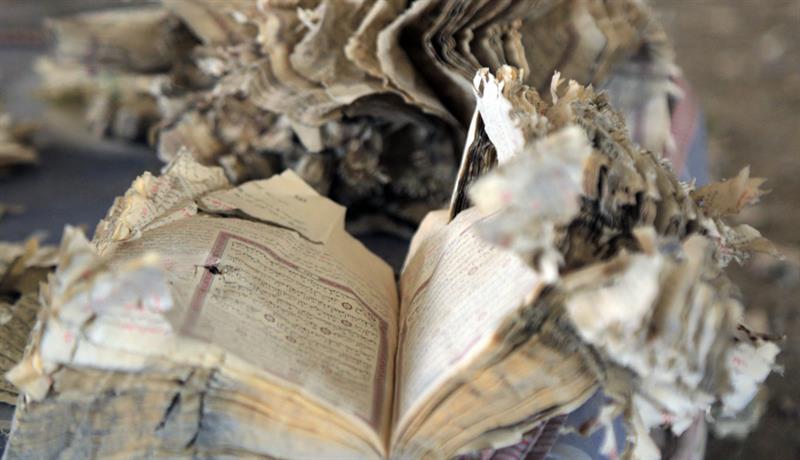
Religious books burnt at a mosque in Yemen s northern strategic city of Marib, following a Houthi rebel missile strike attack on a mosque (photo: AFP)
The Iranian-backed Houthi militias have been intensifying their campaign in Marib, Yemen, ignoring calls to scale down fighting and join a UN political settlement process in the war-torn country. Meanwhile, the militias kept targeting civilian positions inside Saudi Arabia, with Saudi defences foiling their attacks.
The war to control the oil-rich region of Marib has been ongoing for almost a year. Reports now say that the Houthis are advancing there at the expense of the legitimate government forces and the Saudi-led Arab Coalition.
Military escalation in Yemen always precedes negotiations between Iran and the United States on Washington’s return to the nuclear deal between Tehran and international powers. A new round of talks is expected by the end of this month, and some Europeans are optimistic about the outcome.
With the prospect of an Iranian-American agreement that might facilitate the rehabilitation of Iran by the international community, regional parties are pushing for their interests to be taken into account. Traditional conflict between Iran and the Arab Gulf countries is in focus, as the Gulf countries expect greater boldness on the part of Iran.
That is why all areas of Iranian influence in the region are flaring up, from Yemen to Lebanon. Recent Gulf anger with Lebanese officials repeating Iranian rhetoric is but a symptom of the wider ramifications of the regional conflict. Remarks by the Lebanese information minister that Yemenis are defending themselves against “external aggression” were followed by remarks from the Lebanese foreign minister that Saudi Arabia and other Gulf countries were considered aggressive to them.
Four Gulf countries suspended diplomatic relations with Beirut in what looks like pressure on the Lebanese authorities to curb the Iranian-backed Hizbullah. More Gulf measures are being taken to sway Lebanon away from Iranian influence.
This week, the Kuwaiti daily newspaper Assiyasa reported the arrest of a group accused of working for Lebanese Hizbullah, according to security sources quoted by the paper. The state security service accused the four Kuwaitis, one of whom is said to be son of a former MP, of “cooperating with Hizbullah in recruiting youth to work with the party in Syria and Yemen.” The group is also accused of “laundering money for the party, financing recruits to join the terrorist group and participate in terrorist activities and drug trafficking.”
Another Kuwaiti daily newspaper, Al Qabas, said that “in the midst of an escalating crisis between the Gulf states and Lebanon and the inability of Lebanon to resolve the issue, the Gulf countries are considering taking new measures against Lebanon.” The paper reported that it “learned that certain countries that recalled their ambassadors from Beirut may suspend flights to Lebanon in the next few days.”
Calls for a boycott of Lebanon, especially Lebanese goods, on Saudi and Gulf social media accounts are gathering steam. Those calls gained momentum after the statement by Lebanese Foreign Minister Abdallah Bou Habib: “We are facing a big problem. If they just want Hizbullah’s head on a plate, we can’t give them that. Hizbullah is a component of politics in Lebanon.”
Some pundits are linking increased Houthi attacks on targets in Saudi Arabia with the Lebanon issue, citing close relations between Hizbullah and the Houthis. Others maintain that attacks on civilian targets in Saudi Arabia are related to intensified fighting in Marib, where the coalition forces bombard the Houthi militia in support of legitimate government forces.
The Saudi commentator Abdul-Aziz Alkhames acknowledges the Hizbullah factor in Yemen, but says the war in Marib is behind the recent escalation. “For sure, Hizbullah is supporting the Houthi militias on Tehran’s instructions. But I think the military escalation in Yemen is not a response to the Lebanon crisis. It is the battle for Marib that has been going on for almost a year now, before the issues with Lebanon erupted,” he told Al-Ahram Weekly.
“The battle for Marib is the main cause of the current escalation in hostilities. The reason Houthis are stepping up fighting is that they feel the weakness of legitimate government forces there. Unfortunately, the government relied on the Muslim Brotherhood, which let it down. The Brotherhood has no interest in defending the country, their doctrine is to fight for their own interests. For example they focus on Taiz, where the group has influence; indeed it seems the Brotherhood has had a clandestine agreement with Houthi militia not to sweep Taiz,” Alkhames added.
This is a notion that Andrew Hammond of Oxford University upholds. He told the Weekly that the Gulf countries also anticipate that President Biden will join the nuclear deal soon, probably next month, and they’ll be left with no cards in the struggle with Iran and “that could be part of the angst”. He added that the “US is pressuring them to agree to lift the blockade before a ceasefire”, which is a main Houthi demand to agree on negotiations about political settlement.
But the link between all these issues, all involving Iran and its proxies, is undeniable. A semi-official source in a Gulf country said that Tehran is stepping up its conventional destabilising policies in the region preceding its negotiations with the West.
“It is not only in Lebanon. Iraq is now another arena where Iran is flexing its muscles using its proxy militias in the Arab country. Tehran is wary of Prime Minister Mustafa Al-Kadhimi, who has started pursuing a new approach of returning Iraq to its Arab fold and away from Iranian influence. The Arab countries, especially the Gulf countries plus Egypt and Jordan, have been very positive in meeting Kadhimi’s efforts with more cooperation,” the Gulf source told the Weekly.
The next few weeks might see more escalation in Yemen and other areas where Iran has influence and this may well be the case until Iranian-American negotiations yield clear results.
Short link: